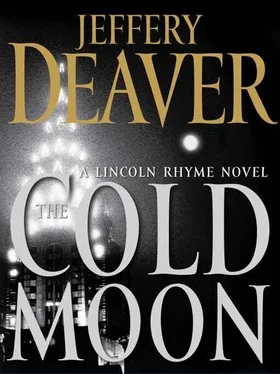"My downfall," Dance said. "Sweets…I'm getting hungry." Then she said, "Sorry, I got distracted." Leaving the notebook closed, she looked into the woman's eyes. "Back to your visitor. You were saying, you made your tea. Running the bath. You feel a breeze. You go into the bedroom. The window's open. What was I asking? Oh, was there anything else you saw that was out of the ordinary?"
"Not really." She said this quickly, as before, but then she squinted. "Wait. You know…there was one thing."
"Really?"
Dance had done what's known as "flooding." She'd decided that it wasn't only the Watchmaker that was bothering Lucy but rather her duty overseas, as well as the upcoming awards ceremony, for some reason. Dance had gone back to the topics and kept bombarding her with questions, in hopes of numbing her and letting the other memories break through.
Lucy rose and walked to the bedroom. Saying nothing, Dance followed her. Amelia Sachs joined them.
The soldier looked around the room.
Careful, Dance told herself. Lucy was onto something. Dance kept silent. Too many interviewers ruin a session by pouncing. The rule with vague memories is that you can let them surface but you can rarely reel them in.
Watching and listening are the two most important parts of the interview. Talking comes last.
"There was something that bothered me, something other than the window being open… Oh, you know what? I've got it. When I walked to the bedroom earlier, to see about the ticking, something was different-I couldn't see the dresser."
"Why was that unusual?"
"Because when I left to go to the health club I glanced at it to see if my sunglasses were there. They were and I picked them up. But then when I looked into the room later, when I heard the ticking, I couldn't see the dresser-because the closet door was partly open."
Dance said, "So after the man left the clock he was probably hiding in the closet or behind the door."
"Makes sense," Lucy said.
Dance turned to Sachs, who nodded with a smile and said, "Good. I better get to work." And she pulled open the closet door with her latex-gloved hand.
A second time they'd failed.
Duncan was driving even more carefully, meticulously, than he usually did.
He was silent and completely calm. Which bothered Vincent even more. If Duncan slammed down his fist and screamed, like his stepfather, Vincent would have felt better. ("You did what ?" the man had raged, referring to the rape of Sally Anne. "You fat pervert!") He was worried that Duncan had had enough and was going to give up the whole thing.
Vincent didn't want his friend to go away.
Duncan merely drove slowly, stayed in his lane, didn't speed, didn't try to beat yellow lights.
And didn't say a word for a long time.
Finally he explained to Vincent what had happened: As he'd started to climb to the roof-planning to get into the building, knock on Lucy's door and get her to hang up the phone, he'd glanced down and seen a man in the alley, staring at him, pulling his cell phone from his pocket, shouting for Duncan to stop. The killer had hurried to the roof, run west several buildings then rapelled into the alley. He'd then sprinted to the Buick.
Duncan was driving meticulously, yes, but without any obvious destination. At first Vincent wondered if this was to lose the police but there didn't seem to be any risk of pursuit. Then he decided that Duncan was on automatic pilot, driving in large circles.
Like the hands of a clock.
Once again the shock of a narrow escape faded and Vincent felt the hunger growing again, hurting his jaw, hurting his head, hurting his groin.
If we don't eat, we die.
He wanted to be back in Michigan, hanging out with his sister, having dinner with her, watching TV. But his sister wasn't here, she was miles and miles away, maybe thinking of him right now-but that didn't give him any comfort… The hunger was too intense. Nothing was working out! He felt like screaming. Vincent had better luck cruising strip malls in New Jersey or waiting for a college coed or receptionist jogging through a deserted park. What was the point of-
In his quiet voice Duncan said, "I'm sorry."
"You…?"
"I'm sorry."
Vincent was disarmed. His anger diminished and he wasn't sure what to say.
"You've been helping me, working hard. And look what's happened. I've let you down."
Here was Vincent's mother, explaining to him, when he was ten, that she'd let him down with Gus, then with her second husband, then with Bart, then with Rachel the experiment, then with her third husband.
And every time, young Vincent had said just what he said now. "It's okay."
"No, it's not…I talk about the great scheme of things. But that doesn't minimize our disappointments. I owe you. And I'll make it up to you."
Which is something his mother never said, much less did, leaving Vincent to find what comfort he could in food, TV shows, spying on girls and having his heart-to-hearts.
No, it was clear that his friend, Duncan, meant what he was saying. He was genuinely remorseful that Vincent hadn't been able to have Lucy. Vincent still felt the urge to cry but now for a different reason. Not from the hunger, not from frustration. He felt filled with an odd sensation. People hardly ever said nice things to him like this. People hardly ever worried about him.
"Look," Duncan said, "the one I'm going to do next. You're not going to want her."
"Is she ugly?"
"Not really. It's just the way she's going to die…I'm going to burn her."
"Oh."
"In the book, remember the alcohol torture?"
"Not really."
The pictures in the book were of men being tortured; they hadn't interested Vincent.
"You pour alcohol on the lower half of someone's body and set fire to it. You can put out an alcohol fire quickly if they confess. Of course, I'm not going to be putting it out."
True, Vincent agreed, he wouldn't want her after that.
"But I have another idea."
Duncan then explained what he had in mind, Vincent's spirits improving with every word. Duncan asked, "Don't you think it'll work out for everybody?"
Well, not quite everybody, thought Clever Vincent, who was back and in a pretty good mood, all things considered.
Sitting in front of the evidence charts, Rhyme heard Sachs come back on the line.
"Okay, Rhyme. We've found he was hiding in the closet."
"Which one?"
"In Lucy's bedroom."
Rhyme closed his eyes. "Describe it to me."
Sachs gave him the whole scene-the hallway leading to the bedroom, the layout of the bedroom itself then the furniture, pictures on the wall, the Watchmaker's entrance and exit route and other details. Everything was described in precise, objective detail. Her training and experience shone as sharply as her red hair. If she left the force he wondered how long it would take another cop to walk the grid as well as she did.
Forever, he thought cynically.
Anger flared for a moment. Then he forced the emotion away and concentrated again on her words.
Sachs described the closet. "Six feet four inches wide. Filled with clothes. Men's on the left, women's on the right, half and half. Shoes on the floor. Fourteen pair. Four men's, ten women's."
A typical ratio, Rhyme reflected, for a married couple, thinking of his own closet from years ago. "When he was hiding, was he lying on the floor?"
"No. Too many boxes."
He heard her ask a question. Then she came back on the line. "The clothes're ordered now but he must've moved them. I can see some boxes moved on the floor and a few bits of that roofing tar we found earlier."
"What were the clothes he was hiding between?"
"A suit. And Lucy's army uniform."
Читать дальше












